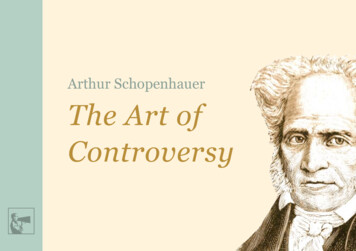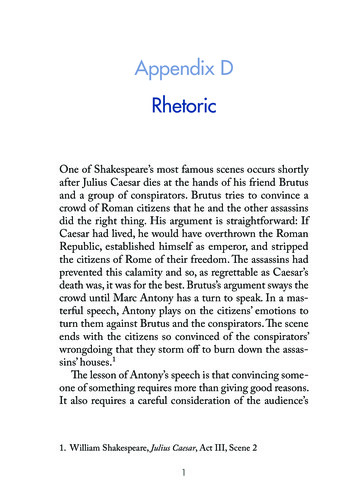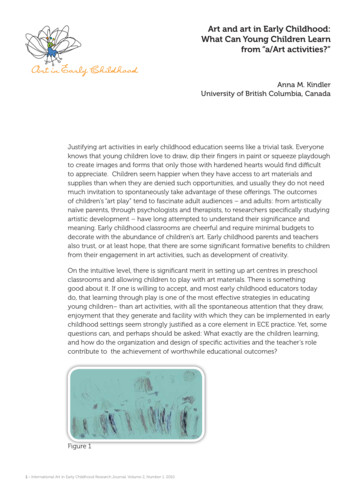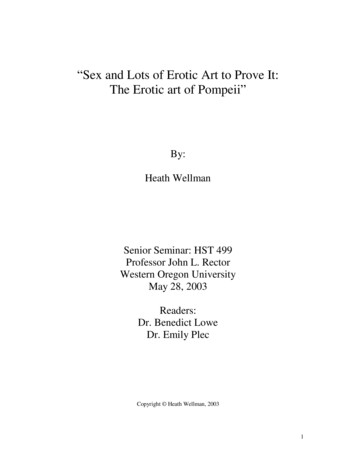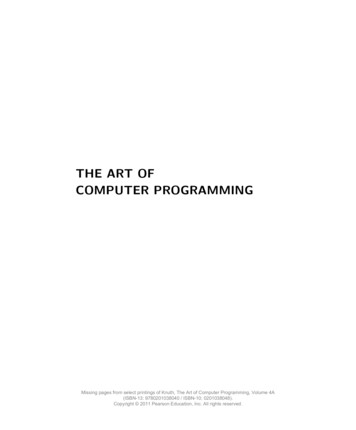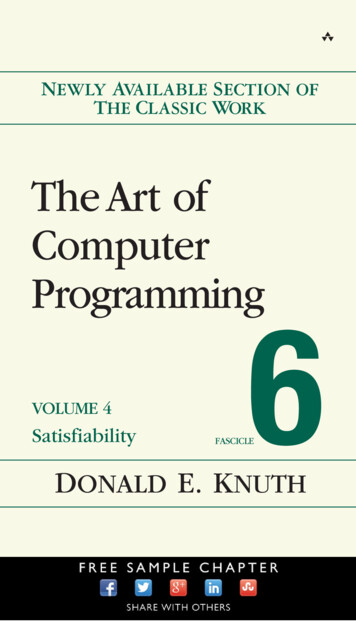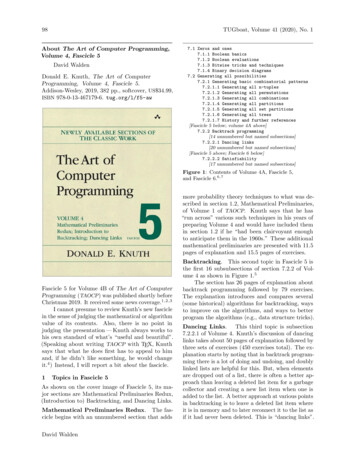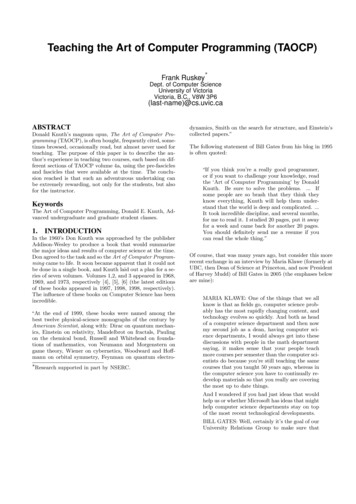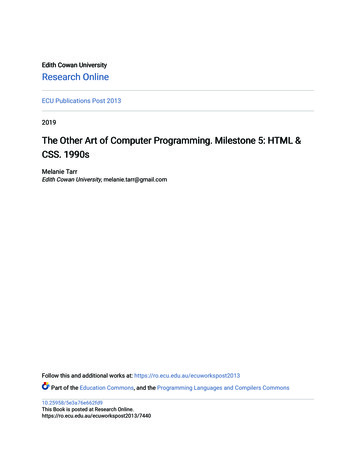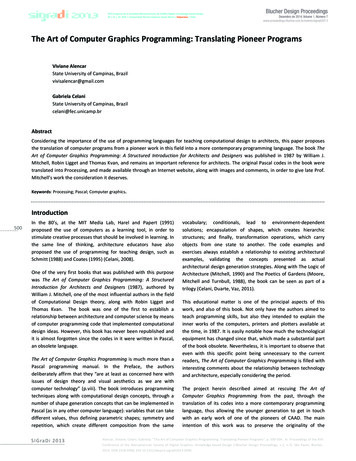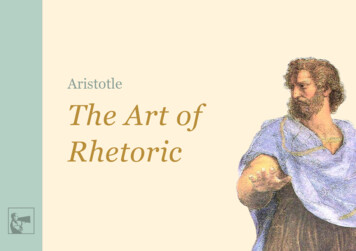
Transcription
AristotleThe Art ofRhetoricAristotle The Art of Rhetoric1
AristotleThe Art of RhetoricTranslation and index by W. Rhys RobertsMegaphone eBooks 2008Aristotle The Art of Rhetoric2
BOOK IAristotle The Art of Rhetoric3
BOOK IPart 1Rhetoric is the counterpart of Dialectic. Bothalike are concerned with such things as come,more or less, within the general ken of all menand belong to no definite science. Accordingly allmen make use, more or less, of both; for to acertain extent all men attempt to discuss statements and to maintain them, to defend themselves and to attack others. Ordinary people dothis either at random or through practice andfrom acquired habit. Both ways being possible,the subject can plainly be handled systematically,for it is possible to inquire the reason why somespeakers succeed through practice and othersspontaneously; and every one will at once agreethat such an inquiry is the function of an art.Now, the framers of the current treatises onrhetoric have constructed but a small portion ofthat art. The modes of persuasion are the onlyAristotle The Art of Rhetorictrue constituents of the art: everything else ismerely accessory. These writers, however, saynothing about enthymemes, which are the substance of rhetorical persuasion, but deal mainlywith non-essentials. The arousing of prejudice,pity, anger, and similar emotions has nothing todo with the essential facts, but is merely a personal appeal to the man who is judging the case.Consequently if the rules for trials which are nowlaid down some states — especially in wellgoverned states — were applied everywhere, suchpeople would have nothing to say. All men, nodoubt, think that the laws should prescribe suchrules, but some, as in the court of Areopagus, givepractical effect to their thoughts and forbid talkabout non-essentials. This is sound law andcustom. It is not right to pervert the judge bymoving him to anger or envy or pity — one might4
as well warp a carpenter’s rule before using it.Again, a litigant has clearly nothing to do but toshow that the alleged fact is so or is not so, that ithas or has not happened. As to whether a thing isimportant or unimportant, just or unjust, thejudge must surely refuse to take his instructionsfrom the litigants: he must decide for himself allsuch points as the law-giver has not alreadydefined for him.Now, it is of great moment that well-drawnlaws should themselves define all the points theypossibly can and leave as few as may be to the decision of the judges; and this for several reasons.First, to find one man, or a few men, who aresensible persons and capable of legislating andadministering justice is easier than to find a largenumber. Next, laws are made after long consideration, whereas decisions in the courts are given atshort notice, which makes it hard for those whotry the case to satisfy the claims of justice andexpediency. The weightiest reason of all is thatAristotle The Art of Rhetoricthe decision of the lawgiver is not particular butprospective and general, whereas members of theassembly and the jury find it their duty to decideon definite cases brought before them. They willoften have allowed themselves to be so muchinfluenced by feelings of friendship or hatred orself-interest that they lose any clear vision of thetruth and have their judgement obscured by considerations of personal pleasure or pain. In general, then, the judge should, we say, be allowed todecide as few things as possible. But questions asto whether something has happened or has nothappened, will be or will not be, is or is not, mustof necessity be left to the judge, since the lawgivercannot foresee them. If this is so, it is evident thatany one who lays down rules about other matters,such as what must be the contents of the ‘introduction’ or the ‘narration’ or any of the otherdivisions of a speech, is theorizing about nonessentials as if they belonged to the art. The onlyquestion with which these writers here deal is5
how to put the judge into a given frame of mind.About the orator’s proper modes of persuasionthey have nothing to tell us; nothing, that is,about how to gain skill in enthymemes.Hence it comes that, although the same systematic principles apply to political as to forensicoratory, and although the former is a nobler business, and fitter for a citizen, than that which concerns the relations of private individuals, theseauthors say nothing about political oratory, buttry, one and all, to write treatises on the way toplead in court. The reason for this is that in political oratory there is less inducement to talk aboutnonessentials. Political oratory is less given tounscrupulous practices than forensic, because ittreats of wider issues. In a political debate the manwho is forming a judgement is making a decisionabout his own vital interests. There is no need,therefore, to prove anything except that the factsare what the supporter of a measure maintainsthey are. In forensic oratory this is not enough; toAristotle The Art of Rhetoricconciliate the listener is what pays here. It is otherpeople’s affairs that are to be decided, so that thejudges, intent on their own satisfaction andlistening with partiality, surrender themselves tothe disputants instead of judging between them.Hence in many places, as we have said already,irrelevant speaking is forbidden in the law-courts:in the public assembly those who have to form ajudgement are themselves well able to guardagainst that.It is clear, then, that rhetorical study, in itsstrict sense, is concerned with the modes of persuasion. Persuasion is clearly a sort of demonstration, since we are most fully persuaded whenwe consider a thing to have been demonstrated.The orator’s demonstration is an enthymeme, andthis is, in general, the most effective of the modesof persuasion. The enthymeme is a sort of syllogism, and the consideration of syllogisms of allkinds, without distinction, is the business ofdialectic, either of dialectic as a whole or of one of6
its branches. It follows plainly, therefore, that hewho is best able to see how and from what elements a syllogism is produced will also be bestskilled in the enthymeme, when he has furtherlearnt what its subject-matter is and in whatrespects it differs from the syllogism of strictlogic. The true and the approximately true areapprehended by the same faculty; it may also benoted that men have a sufficient natural instinctfor what is true, and usually do arrive at the truth.Hence the man who makes a good guess at truthis likely to make a good guess at probabilities.It has now been shown that the ordinarywriters on rhetoric treat of non-essentials; it hasalso been shown why they have inclined moretowards the forensic branch of oratory.Rhetoric is useful (1) because things that aretrue and things that are just have a natural tendency to prevail over their opposites, so that if thedecisions of judges are not what they ought to be,the defeat must be due to the speakers themAristotle The Art of Rhetoricselves, and they must be blamed accordingly.Moreover, (2) before some audiences not even thepossession of the exactest knowledge will make iteasy for what we say to produce conviction. Forargument based on knowledge implies instruction, and there are people whom one cannotinstruct. Here, then, we must use, as our modes ofpersuasion and argument, notions possessed byeverybody, as we observed in the Topics whendealing with the way to handle a popular audience. Further, (3) we must be able to employpersuasion, just as strict reasoning can be employed, on opposite sides of a question, not inorder that we may in practice employ it in bothways (for we must not make people believe whatis wrong), but in order that we may see clearlywhat the facts are, and that, if another man arguesunfairly, we on our part may be able to confutehim. No other of the arts draws opposite conclusions: dialectic and rhetoric alone do this. Boththese arts draw opposite conclusions impartially.7
Nevertheless, the underlying facts do not lendthemselves equally well to the contrary views. No;things that are true and things that are better are,by their nature, practically always easier to proveand easier to believe in. Again, (4) it is absurd tohold that a man ought to be ashamed of beingunable to defend himself with his limbs, but notof being unable to defend himself with speech andreason, when the use of rational speech is moredistinctive of a human being than the use of hislimbs. And if it be objected that one who uses suchpower of speech unjustly might do great harm,that is a charge which may be made in commonagainst all good things except virtue, and aboveall against the things that are most useful, asstrength, health, wealth, generalship. A man canconfer the greatest of benefits by a right use ofthese, and inflict the greatest of injuries by usingthem wrongly.It is clear, then, that rhetoric is not bound upwith a single definite class of subjects, but is asAristotle The Art of Rhetoricuniversal as dialectic; it is clear, also, that it isuseful. It is clear, further, that its function is notsimply to succeed in persuading, but rather todiscover the means of coming as near such successas the circumstances of each particular case allow.In this it resembles all other arts. For example, itis not the function of medicine simply to make aman quite healthy, but to put him as far as may beon the road to health; it is possible to give excellent treatment even to those who can never enjoysound health. Furthermore, it is plain that it is thefunction of one and the same art to discern thereal and the apparent means of persuasion, justas it is the function of dialectic to discern the realand the apparent syllogism. What makes a man a‘sophist’ is not his faculty, but his moral purpose.In rhetoric, however, the term ‘rhetorician’ maydescribe either the speaker’s knowledge of the art,or his moral purpose. In dialectic it is different: aman is a ‘sophist’ because he has a certain kind of8
moral purpose, a ‘dialectician’ in respect, not ofhis moral purpose, but of his faculty.Let us now try to give some account of thesystematic principles of Rhetoric itself — of theright method and means of succeeding in theobject we set before us. We must make as it werea fresh start, and before going further define whatrhetoric is.Aristotle The Art of Rhetoric9
BOOK IPart 2Rhetoric may be defined as the faculty of observingin any given case the available means of persuasion. This is not a function of any other art. Everyother art can instruct or persuade about its ownparticular subject-matter; for instance, medicineabout what is healthy and unhealthy, geometryabout the properties of magnitudes, arithmeticabout numbers, and the same is true of the otherarts and sciences. But rhetoric we look upon asthe power of observing the means of persuasionon almost any subject presented to us; and that iswhy we say that, in its technical character, it isnot concerned with any special or definite class ofsubjects.Of the modes of persuasion some belong strictly to the art of rhetoric and some do not. By thelatter I mean such things as are not supplied bythe speaker but are there at the outset-witnesses,Aristotle The Art of Rhetoricevidence given under torture, written contracts,and so on. By the former I mean such as we canourselves construct by means of the principles ofrhetoric. The one kind has merely to be used, theother has to be invented.Of the modes of persuasion furnished by thespoken word there are three kinds. The first kinddepends on the personal character of the speaker;the second on putting the audience into a certainframe of mind; the third on the proof, or apparentproof, provided by the words of the speech itself.Persuasion is achieved by the speaker’s personalcharacter when the speech is so spoken as tomake us think him credible. We believe good menmore fully and more readily than others: this istrue generally whatever the question is, andabsolutely true where exact certainty is impossible and opinions are divided. This kind of10
persuasion, like the others, should be achieved bywhat the speaker says, not by what people thinkof his character before he begins to speak. It is nottrue, as some writers assume in their treatises onrhetoric, that the personal goodness revealed bythe speaker contributes nothing to his power ofpersuasion; on the contrary, his character mayalmost be called the most effective means of persuasion he possesses. Secondly, persuasion maycome through the hearers, when the speech stirstheir emotions. Our judgements when we arepleased and friendly are not the same as when weare pained and hostile. It is towards producingthese effects, as we maintain, that present-daywriters on rhetoric direct the whole of their efforts. This subject shall be treated in detail whenwe come to speak of the emotions. Thirdly, persuasion is effected through the speech itself whenwe have proved a truth or an apparent truth bymeans of the persuasive arguments suitable to thecase in question.Aristotle The Art of RhetoricThere are, then, these three means of effectingpersuasion. The man who is to be in command ofthem must, it is clear, be able (1) to reason logically, (2) to understand human character andgoodness in their various forms, and (3) to understand the emotions — that is, to name themand describe them, to know their causes and theway in which they are excited. It thus appears thatrhetoric is an offshoot of dialectic and also of ethical studies. Ethical studies may fairly be calledpolitical; and for this reason rhetoric masquerades as political science, and the professors of itas political experts — sometimes from want ofeducation, sometimes from ostentation, sometimes owing to other human failings. As a matterof fact, it is a branch of dialectic and similar to it,as we said at the outset. Neither rhetoric nor dialectic is the scientific study of any one separatesubject: bo
question with which these writers here deal is . Aristotle The Art of Rhetoric 6 how to put the judge into a given frame of mind. About the orator’s proper modes of persuasion they have nothing to tell us; nothing, that is, about how to gain skill in enthymemes. Hence it comes that, although the same sys-tematic principles apply to political as to forensic oratory, and although the former is .
